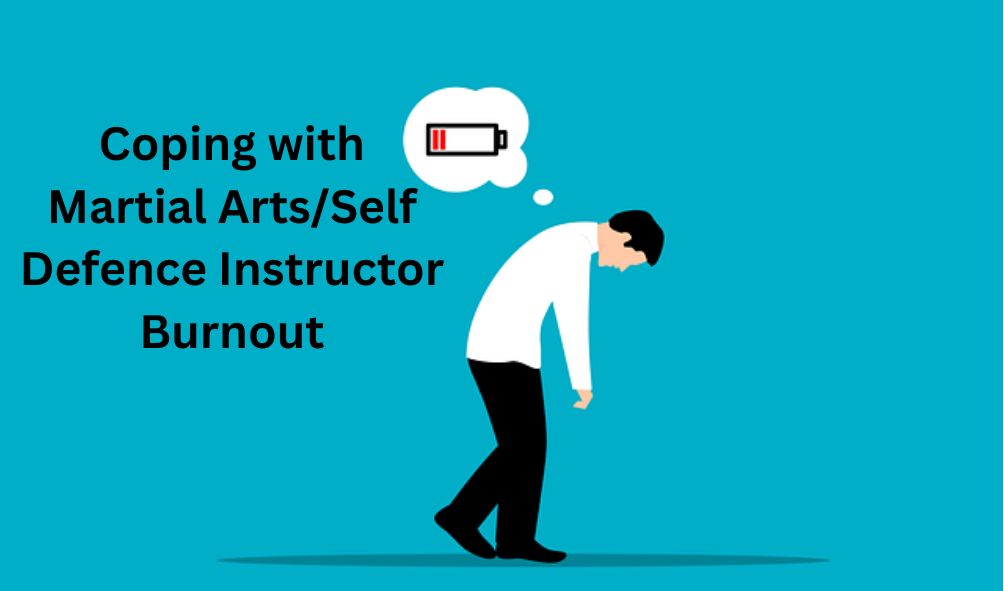Managing Compassion Fatigue or Burnout Due to the Emotional and Physical Demands of Being a Martial Arts/Self Defence Instructor
You have a significant impact on people’s ability to defend themselves, win tournaments and develop skills that can improve their safety and wellbeing as a self defence or martial arts instructor. However, the mental and physical demands of this job can have an adverse effect on your own wellbeing. Self defence and martial arts instructors frequently struggle with burnout and compassion fatigue, so it’s critical to identify and treat these problems if you want to maintain your health and continue to teach your students effectively.
Understanding Burnout and Compassion Fatigue
Burnout is a condition of persistent physical and emotional exhaustion that develops after being exposed to stressors like high workloads, long hours, and a lack of control over one’s work for an extended period of time. It can affect your general mental, emotional, and physical health and cause feelings of exhaustion, cynicism, and detachment from work.
On the other hand, compassion fatigue is a type of secondary trauma that happens when you are repeatedly exposed to the trauma and suffering of others, such as when you hear students’ stories of their past experiences or see their struggles first-hand while you are in training. This may result in emotional exhaustion, a reduction in empathy, and feelings of helplessness or hopelessness.
Understanding the Symptoms of Compassion Fatigue and Burnout
Knowing the warning signs and symptoms of burnout and compassion fatigue will help you spot them early and take the necessary action to address them. In martial arts and self defence instructors, some typical symptoms of burnout and compassion fatigue may include:
1. Constant exhaustion, both mentally and physically.
2. More frequent mood swings or irritability.
3. A decline in enthusiasm or motivation for teaching.
4. Having trouble focusing or making decisions.
5. A diminished sense of accomplishment or job satisfaction.
6. A greater distance or cynicism towards students or instruction.
7. Physical signs like migraines, tummy aches, or recurring illnesses.
8. Changes in appetite or sleep patterns.
9. Apathy or emotional distance from close relationships.
10. A rise in the use of unhealthy coping strategies like alcohol or drug abuse.
If you notice any of these symptoms in yourself, it’s critical to take them seriously and address them right away to avoid further harm to your wellbeing.
Coping Techniques to Manage Compassion Fatigue and Burnout
1. Self-Care: Prioritise self-care in your daily activities. Exercise, sufficient sleep, a healthy diet, relaxation techniques, and participating in hobbies or enjoyable activities can all fall under this category. It’s crucial to look after your physical and mental health if you want to avoid burnout and compassion fatigue.
2. Establish Limits: Clearly define the boundaries between your personal and professional lives. Do not overwork yourself or take on too many obligations as this can cause excessive stress and exhaustion.
3. Seek Support: Don’t be afraid to ask for help from dependable family members, friends, or coworkers. Having a conversation partner can help you process your feelings and de-stress. For assistance with overcoming any emotional difficulties, you might also think about getting professional assistance from a therapist or counsellor.
4. Practice mindfulness: Incorporate mindfulness techniques into your daily routine, such as journaling, deep breathing, or meditation. These methods can help you lower your stress levels, become more present in the moment, and enhance your general wellbeing.
5. Engage in Professional Development: To improve your knowledge and abilities as a martial arts or self defence instructor, continue your professional development. This can lessen stress and teacher burnout by boosting your confidence and competence.
6. Take Regular Breaks: Take regular breaks throughout the day, and make sure you take regular breaks to rest and recharge. The risk of burnout and compassion fatigue can be increased by working long hours without taking breaks.
7. Encourage a Supportive Work Environment: Surround yourself with coworkers and a team who are understanding of the difficulties you face as a martial arts or self defence instructor. In order to create a positive learning environment that supports wellbeing, encourage open communication, teamwork, and mutual support.
8. Work on self-reflection: Consider your feelings, ideas, and experiences in relation to your job as a martial arts or self defence instructor. You can take the necessary steps to address any triggers or patterns that may contribute to burnout or compassion fatigue by regularly reflecting on yourself.
9. Exercise Self-Compassion: Show yourself compassion and be kind to yourself. Keep in mind that it’s normal for people to make mistakes or have limitations. Give yourself the same consideration and consideration that you give to your students.
10. Discover the Meaning and Purpose of Your Work: Reconnect with the significance and goal of your work as a martial arts or self defence instructor. Remind yourself of the contribution you make in empowering and assisting others in developing their skills. Even in trying times, having a sense of purpose can keep you motivated and fulfilled.
11. Take Good Care of Your Body: Maintaining good physical health is essential for managing stress and avoiding burnout. To keep your body and mind in top shape, make sure to eat a healthy diet, exercise regularly, and get enough sleep.
12. Set Realistic Expectations: As a martial arts or self defence instructor, be realistic about what you can and cannot control. Avoid having high expectations for yourself or your students because these can cause frustration and disappointment. Let go of things that are out of your control and concentrate on what you can do to the best of your abilities.
In conclusion, it’s critical to prioritize your own wellbeing in order to avoid burnout and compassion fatigue because being a self defence / martial arts instructor can be emotionally and physically demanding. Dealing with burnout and compassion fatigue requires putting self-care strategies into practise, establishing healthy boundaries, creating a supportive work environment, and, when necessary, getting professional assistance.
In order to continue being an effective martial arts or self defence instructor and having a positive influence on your students’ lives, keep in mind that taking care of yourself is not selfish but rather necessary. You are better able to care for others if you take care of yourself.

